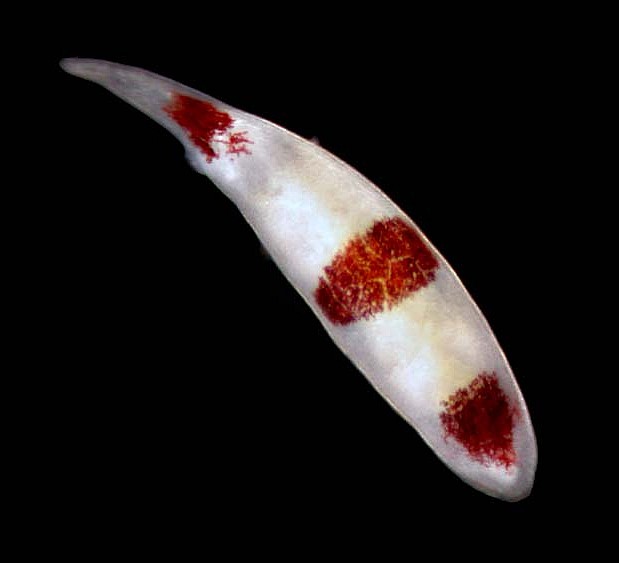- Prolecithophora
Taxobox
name = Prolecithophora

image_width = 200px
image_caption = The Candy-Cane Worm
("Plagiostomum vittatum"),
a common North-East Atlantic species
regnum =Animal ia
phylum = Platyhelminthes
classis =Turbellaria
ordo = Prolecithophora
ordo_authority = Karling, 1940"Prolecithophora" is an order comprised of an estimated 300 species of small (typically 0.2 - 12 mm, one species up to 50 mm), active, aquatic
flatworm s. The order lacks a common English name. Most species are shaped like an elongated, stylized droplet, and are opaque white or yellow; they frequently have contrasting bands or spots in colors such as purple, yellow, red, or brown. They have zero to three (normally two) pairs of pigment-cup eyes, and well developedtactile andchemoreceptor senses. With few exceptions, species are protandric hermaphrodites withinternal fertilization . Egg capsules are, according to species, glued to various hard surfaces; the young hatch as miniature copies of their parents. (Karling, 1940)Ecology
All prolecithophorans are aquatic, with most living in the oceans. Some species, especially those living in freshwater, are predators and scavengers, but many marine species are associated with colonial animals such as
bryozoan s or live as symbionts on larger animals such as urchins; a few species harbor symbiotic algae. Although most are accomplished swimmers, they normally rarely venture far from the bottom; young specimens are sometimes found in plankton. Many species display positive or negativephototaxis . (Norén, 2002)Distribution
The majority of prolecithophorans live in the oceans. There are also brackish and fresh water species; in
Lake Baikal anadaptive radiation has resulted in a number of endemic species. The order has acosmopolitan distribution ; most described species are from temperate waters, while little is known about tropical or deep-sea species. This is probably due to a sampling artefact, as prolecithophorans are known to be common in the tropics; when Norén & Jondelius (2004) sampled the shore adjacent to Phuket Marine Biological Center,Phuket , Thailand, they found 14 species of prolecithophorans, all of which were new to science.Classification
There is no consensus regarding the affinity and classification of Prolecithophora. The classification presented here is after Norén (2002), and is based mainly on molecular data.
* Platyhelminthes
**Rhabditophora
***Neoophora
****Adiaphanida
***** Fecampiida
***** Tricladida
***** Prolecithophora
****** Protomonotresidae - exclusively freshwater species fromLake Baikal , with one exception.
****** Plagiostomidae - mainly marine, a few freshwater species (e.g.Lake Vänern ,Lake Biwa andLake Tanganyika ).
****** Pseudostomidae - exclusively marine species.References
#Karling, T. G. 1940. "Zur Morphologie und Systematik der Alloeocoela Cumulata und Rhabdocoela Lecithophora (Turbellaria)". Acta Zoologica Fennica, 26, 1–260.
# Noren M. 2002. Phylogeny and classification of prolecithophoran flatworms. Doctoral thesis at Stockholm University. ISBN 917265478-3.
# Noren M, Jondelius U. 2002. "Phylogenetic position of the Prolecithophora (Rhabditophora, "Platyhelminthes")". Zoologica Scripta. 31:4
# Noren M, Jondelius U. 2004. "Four new species of the family Plagiostomidae Graff, 1882, (Prolecithophora, "Platyhelminthes") from Phuket, Thailand". Phuket Marine Biological Center Research Bulletin 65:2
Wikimedia Foundation. 2010.
